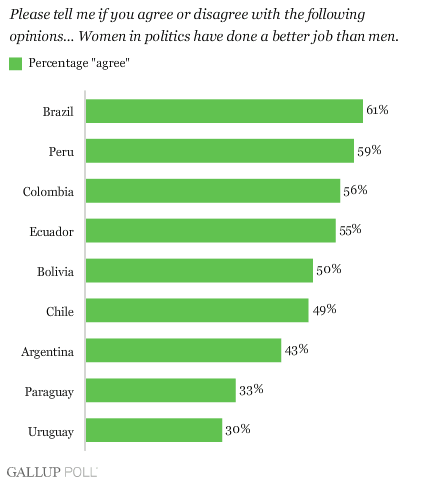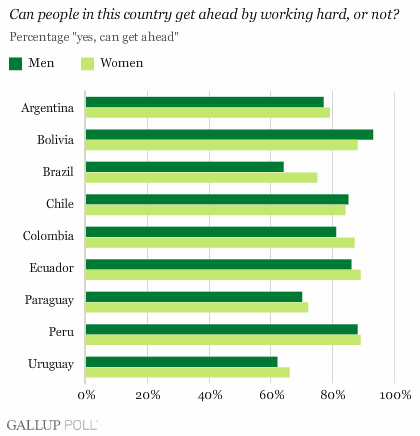WASHINGTON, D.C. -- As Americans consider whether the United States is ready to elect a female president, two countries in stereotypically machista South America -- Argentina and Chile -- have elected female leaders in just the past two years. Most recently, Cristina Fernandez de Kirchner easily won the Argentine presidency. Is her victory a sign of women gaining momentum in South American politics? Or would that be a stretch, considering Fernandez, like Hillary Clinton, became a household name as the first lady of her country?
The growing presence of women in high-profile public offices does seem to be a real trend throughout Latin America. Besides Fernandez, seven other women have been heads of state since 1980, and the number of females in government positions is increasing. In what may be both a result of this trend and a sign of its continuation, recent ║┌┴¤═° Polls point to general acceptance of female leaders in nine South American countries.
Overall, 61% of women across nine countries studied agree with the statement that "Women in politics have done a better job than men" -- but almost half of men (47%) agree as well. At the national level, this perception is most prevalent in Brazil, followed by Peru, Colombia, and Ecuador.

A 2004 analysis from the Inter-American Development Bank noted that since 1991, 12 countries in Central and South America have adopted quotas for women in their national legislative bodies. But the report cited a number of other factors contributing to leadership gains among Latin American women, including changing gender roles, democratization, and gender equality in education -- all developments that have enormous implications for social and economic progress in the region.
These changes are reflected in the perception that equality of opportunity has become the norm. Across the nine South American countries studied, 68% of men and 63% of women say they think women have the same opportunities to realize their aspirations that men do. This view is most prevalent in Peru (76%) and Bolivia (74%) and least prevalent in Uruguay (51%).
Other questions about personal empowerment reveal few differences between men and women. Asked, "Are you satisfied or dissatisfied with your freedom to choose what you do with your life?" women and men say yes in similar proportions in six of the nine countries analyzed; only in Chile, Ecuador, and Peru were they slightly less likely than men to do so. And almost everywhere, women and men are similarly likely to say people in their country can get ahead by working hard -- the exception here is Brazil, where women are significantly more likely than men to feel hard work pays off.

Bottom Line
Some observers have linked women's more visible presence in politics to a yearning for change among Latin Americans, a general feeling that a new approach is needed to reinvent broken political systems. This may well be the case; in every country studied except Uruguay, at least 60% of respondents feel corruption is widespread in their government. Increasingly accepting attitudes regarding women's opportunities in the region's traditionally male-dominated societies lay the groundwork for female leaders to address this popular discontent.
Fernandez, Chilean President Michelle Bachelet, and other women in high-profile public offices will almost certainly face preconceived notions based on their gender. But particularly in countries such as Brazil and Peru, where residents have high opinions of female politicians, the challenge may often be to satisfy inflated expectations of them than to settle doubts about their abilities.
Survey Methods
Results are based on face-to-face interviews with about 1,000 adults, aged 15 and older, in each of the nine countries conducted between June and October 2007. For results based on each national sample, one can say with 95% confidence that the maximum margin of sampling error is ┬▒3 percentage points. In addition to sampling error, question wording and practical difficulties in conducting surveys can introduce error or bias into the findings of public opinion polls.
